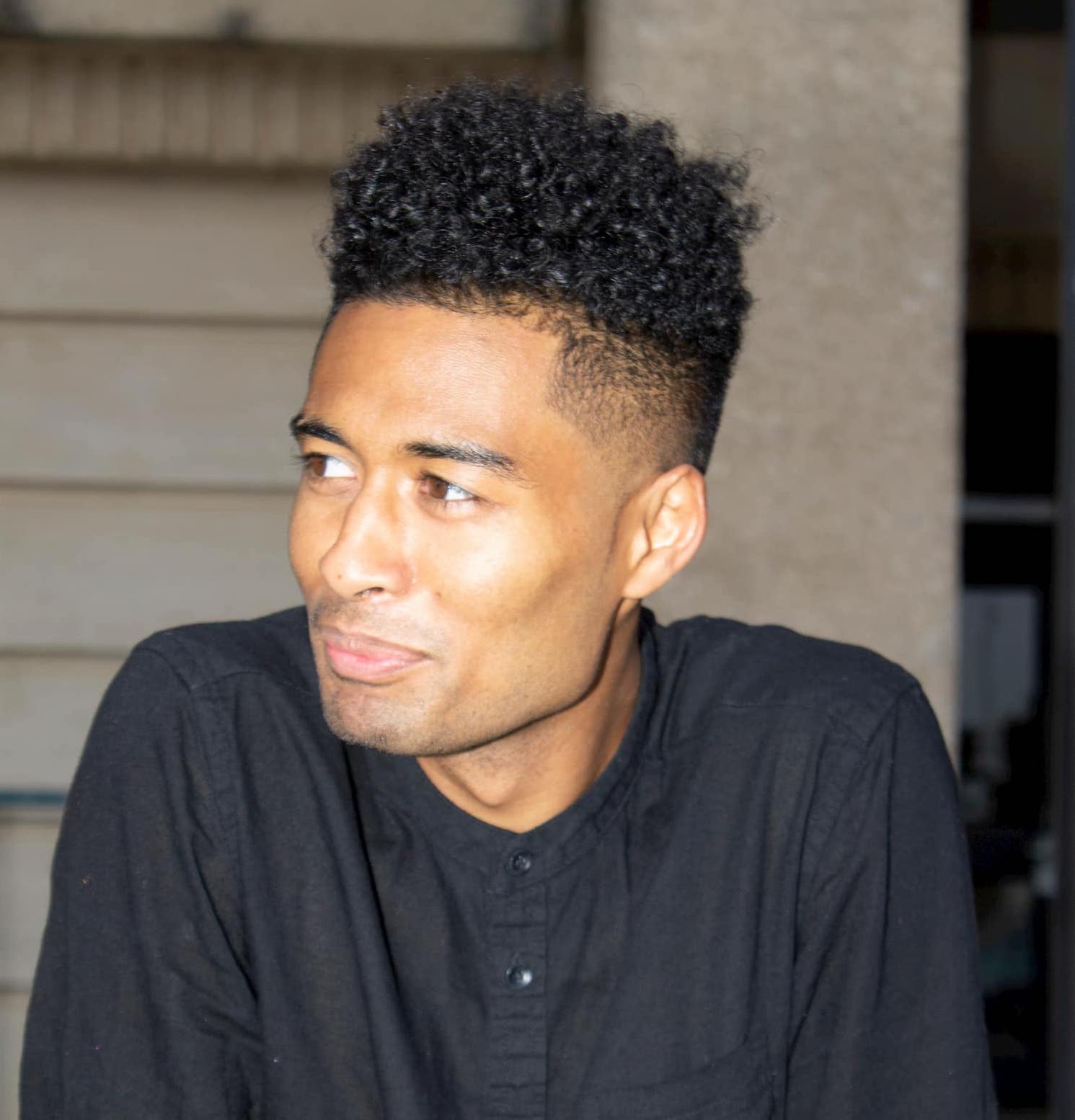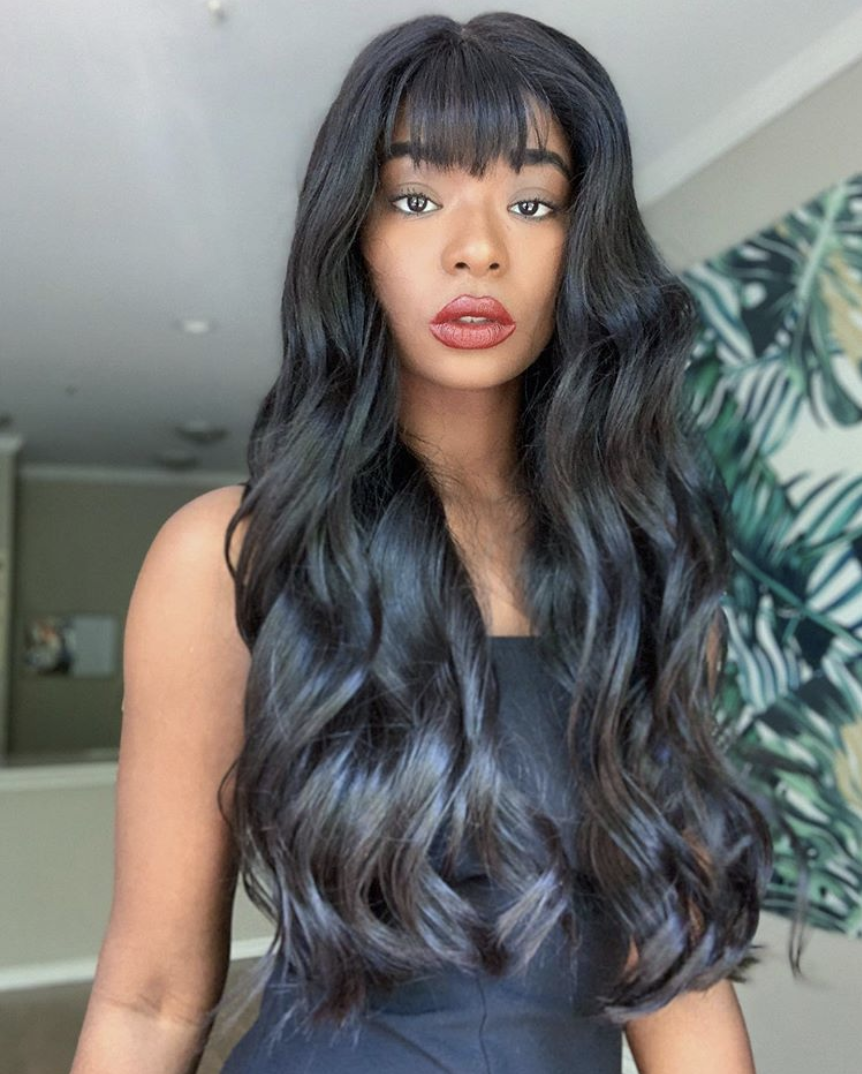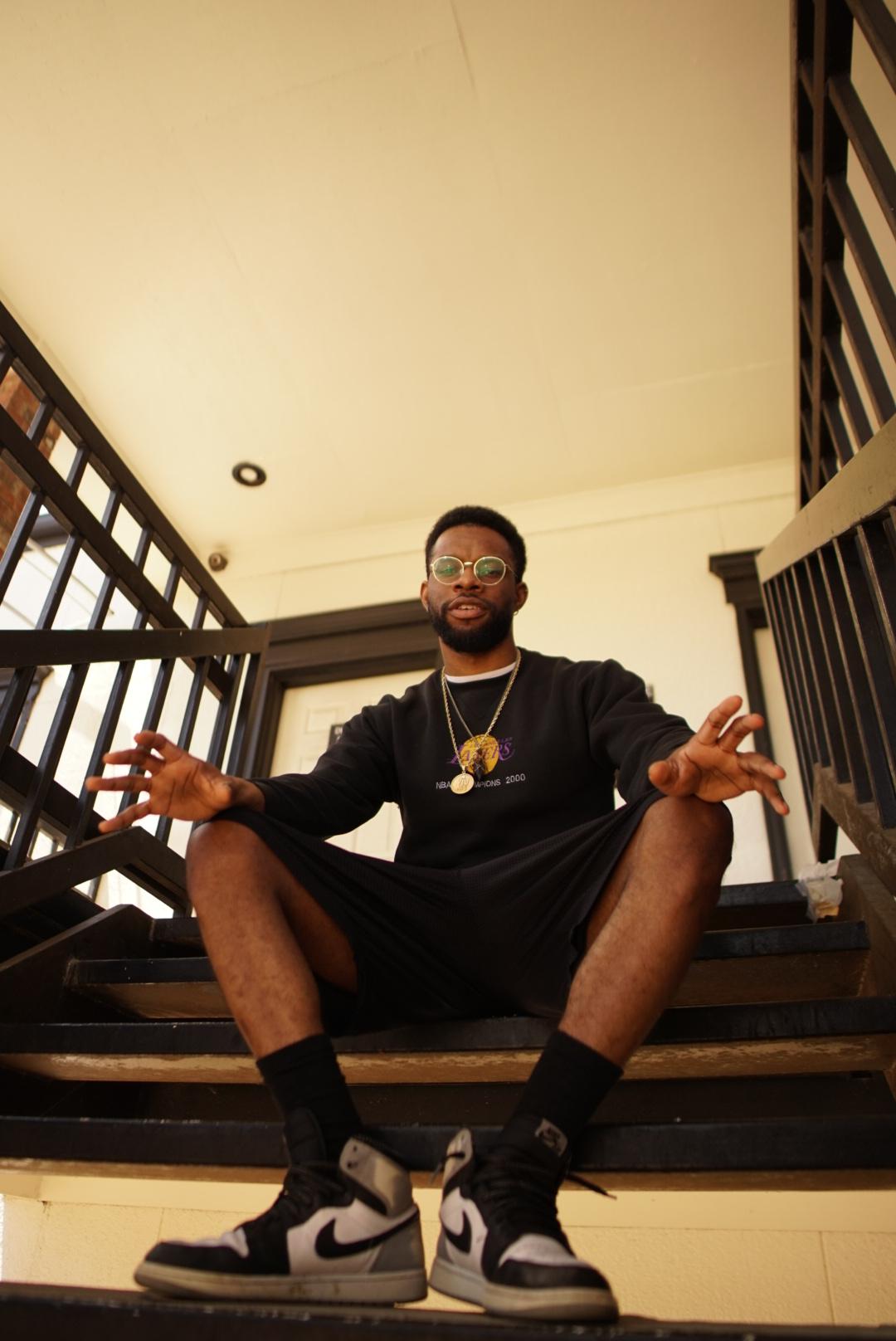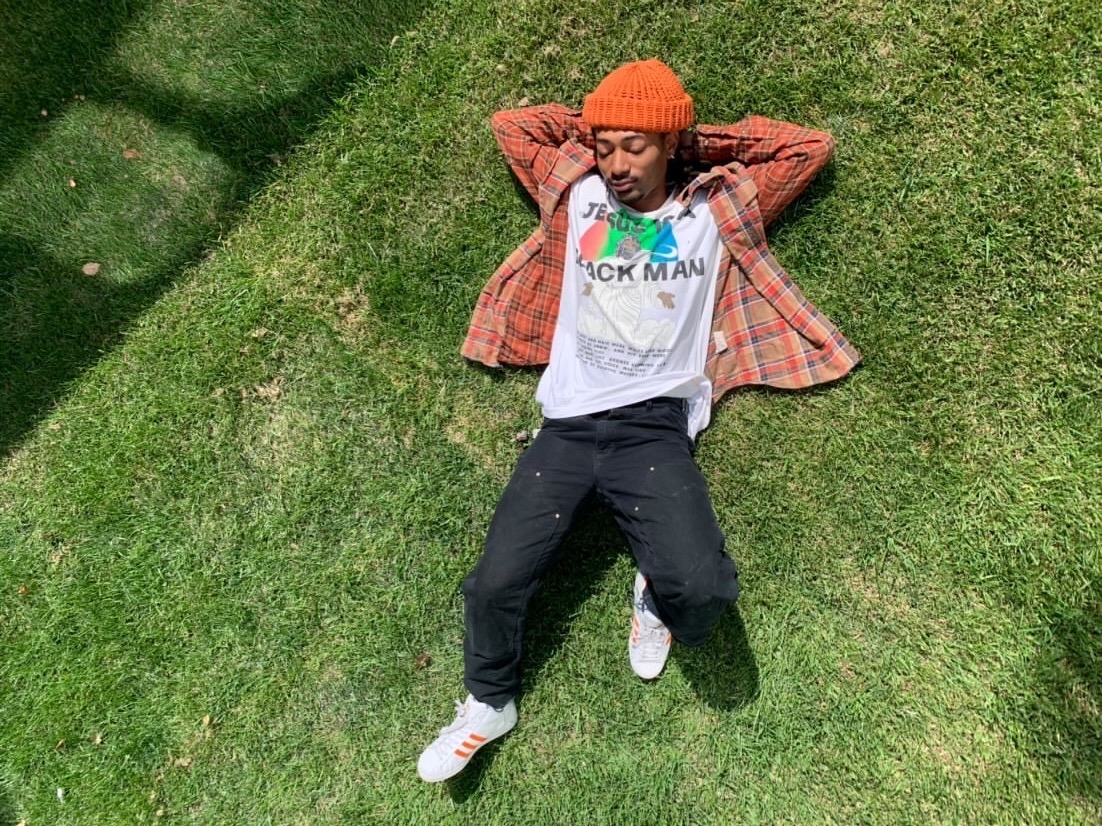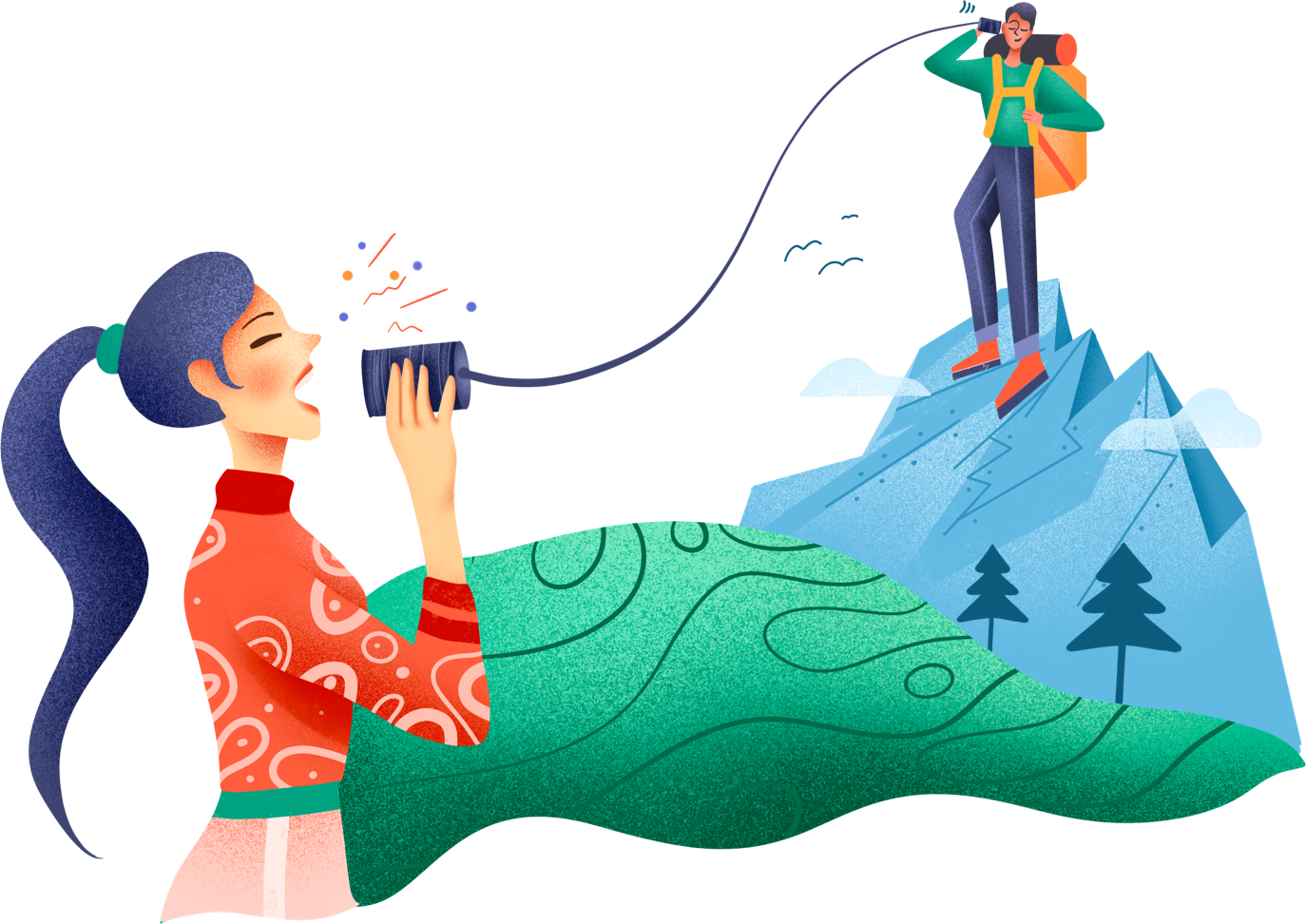Welcome to Conversations with Black Creators. This week, we're chatting with Seattle-based writer and poet, Will Dutcher.
(Editor’s Note: This feature kicks off a new series we’re calling Conversations with Black Creators, which is intended to highlight Black creatives’ work in various fields. At Tako Agency, we are really proud of being creators--people who pour creativity and skill into beautiful projects that add value to a corner of the world--and we want to make sure that all creators have a platform from which to make every corner burst with life.
The murder of George Floyd was a Molotov cocktail smashed onto the simmering rage, grief, and racial injustice that has plagued this country for hundreds of years. I’m not going to go off on a tangent here because the purpose of this series is to amplify Black voices, not mine, but I’ll say this: Black Lives Fucking Matter. End Police Brutality. This time, I hope, change is permanent. It’s up to us--all of us--to make it so.
To support Black creatives, Tako Agency is making a donation to the Black Art Futures Fund for every feature in this series we publish on the Tako Stand. While the outpouring of funding and philanthropic giving currently underway is a GREAT thing, we believe it’s consistent support over time that makes the most difference.
If you or someone you know would like to be featured, please fill out this form and we'll be in touch!
-- Grace, Marketing + Content Director)
Will Dutcher is a multi-talented Dallas-born transplant working and creating in Seattle, WA. He’s worn many hats throughout his life and openly admits this diversity is a result of his desire to slip his feet into the shoes of musicians, skateboarders, and potters on a rotating basis--rather than walk in just one pair for the rest of his life. He says, “I just want it to keep being fun, you know?”
(He’s currently learning to play piano, skateboards on occasion, and hopes to get back to the wheel-thrown pottery he enjoyed in school.)
“I think I really like the idea of playing music,” he says with a chuckle, head turned over his shoulder looking at the black and white keys behind him, “but things are always harder than I think they’re going to be, so it’s just about finding the mental capacity…”
The longer we spoke, the more clearly I saw a thread in his language that explained his hobby-hopping: Will is a generally creative soul, for sure, (and maybe a bit of a romantic) but he’s also driven by a deep desire to first understand the experiences of others, and then translate and communicate them with a unique and compelling voice.
An English major and part-time poet, Dutcher navigates an increasingly complex world with concise, powerful written imagery. We’re lucky to have caught up with him for some questions.
Hey Will. Go ahead and introduce yourself.
I’m a part-time writer. Mostly poetry. I’m trying to transition to longer stuff, but I don’t have the attention span. I don’t know what the deal is with that. [laughs] My day job was in marketing and social media.
(Will’s day job was one of many casualties of the pandemic, but he’s not taking joblessness sitting down. He’s actively looking for work, despite the echoing commentary of peanut galleries past: You can’t actually do anything with an English degree, can you?)
Were you always drawn to the written word, or was there a person, piece of writing, or event in your life that made you want to write?
It was a later thing. What changed the way I thought about writing was an entry-level poetry class, where I read [Hawk Roosting by Ted Hughes] and a lot of my early poems were just trying to recreate that, in a way. More recently, there’s a guy named Hanif Abdurraqib. I discovered him because a friend sent me one of his poems...on Instagram, actually. His writing really changed what I thought poetry could be.
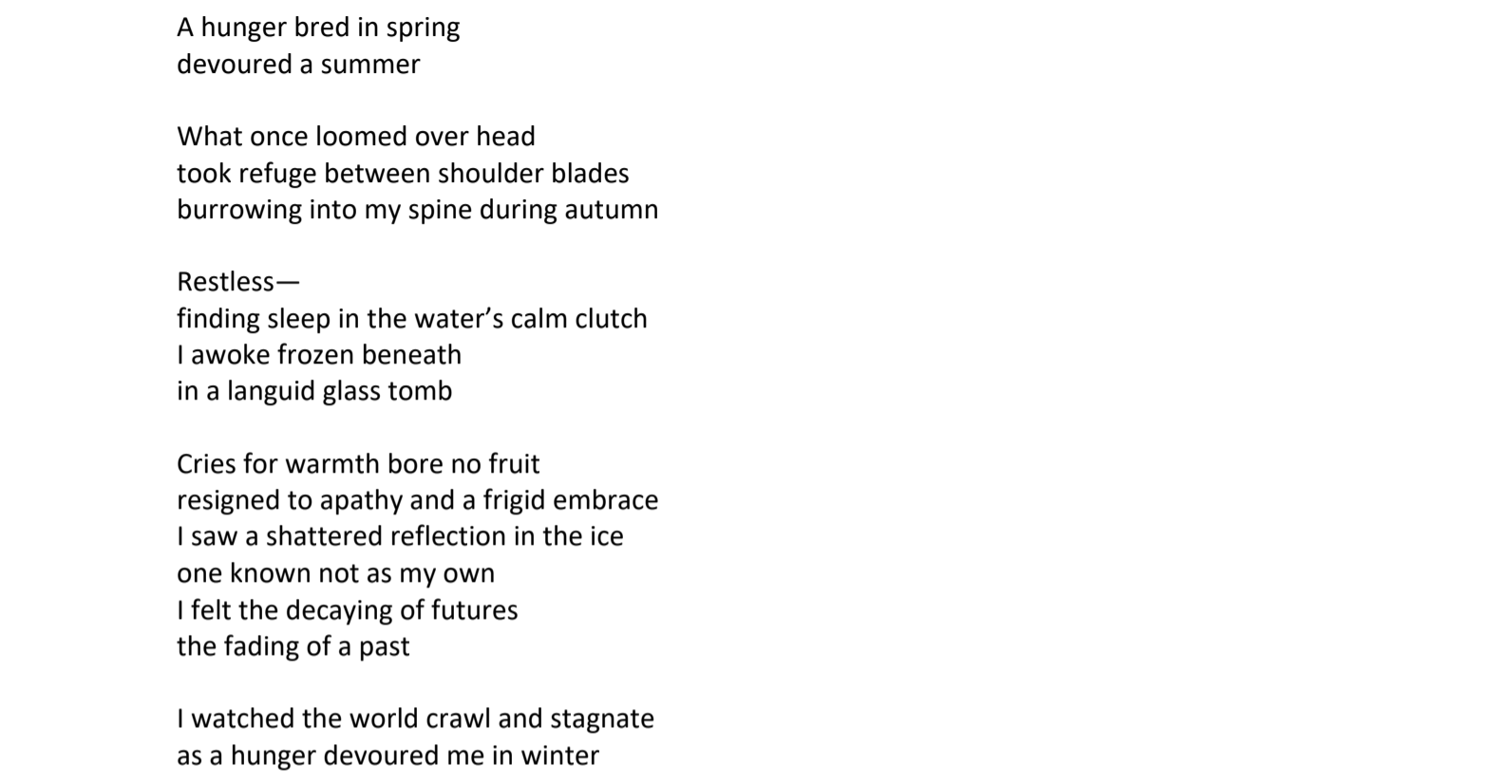
Poem by Will Dutcher, 2019
So, when was the turning point, when you started reading Ted Hughes and decided this is what you wanted to do?
My very first year of [community college], I was in a computer science program. I loved playing computer games, had built my own computer, and had a little experience with coding, so I thought that’s what I really wanted to do. I got there and I hated it. Then I was a business major for a little bit [laughs], and then I ran out of classes because I finished my Associate’s Degree, so I had to transfer to a four-year university.
"Before, I didn’t think there was anything worth my attention in English. Everything I was presented with didn’t incorporate who I was or my experience living."
Freshman year (I was maybe 22 or 23) I didn’t really know what I wanted to do at all. [I remembered that] I had taken an English class in community college and...it wasn’t like any class I’d taken. Before, I didn’t think there was anything worth my attention in English. Everything I was presented with didn’t incorporate who I was or my experience living. I think [that course] got me interested in reading more than anything, and then it was about learning to write like that.
What’s a life lesson you’ve learned recently?
Continually working on something is better than having a “flash of creativity” or whatever. If I don’t sit down and work on something, I won’t do it. I have to schedule things, force myself to make the time, sit down, and just do it.
How about a lesson related to writing, specifically?
I always write with a thesaurus and dictionary because sometimes seeing a word, even if you don’t know [its definition], can be inspiring. The dictionary will help you understand where you need to go with it.
You mentioned that you take time to schedule things and sit down to do them. Other than that, what does your creative process look like, if you have one?
A lot of things for me start out as sentences or phrases. I never have a full idea. I just like a phrase enough that I write it down and see where that takes me. I always write on paper first and once it gets too messy for me to understand what’s going on [laughs], I’ll type it out.
"You can learn to be creative by learning a skill. I think “creativity is an innate ability” [as in, some people don’t have it] is a myth. Society wants to make things more poetic and exclusive than they are. Everyone can be creative."
Do you think creativity is innate, or do you think it can be taught?
You can learn to be creative by learning a skill. I think “creativity is an innate ability” [as in, some people don’t have it] is a myth. Society wants to make things more poetic and exclusive than they are. Everyone can be creative.
Your level of access in childhood really plays into it too. A lot of people don’t have the luxury of spending time on creative pursuits, so it can escape them, but I think creativity is just a human thing, for everyone.

Most of the work you’ve shared is poetry. It’s powerful, but short. Do you think you would ever branch out into long-form writing?
I would like to, but I feel like...I always go off somewhere and lose the point. I need to figure out how to be more concentrated in longer form [writing]. I’d like, at some point, to write a novel.
When I write poems, I can keep it brief; one image that I can build on, or a feeling that I can work with. Sometimes with novels, even when I read them, it’s like, why is it this long? [laughs] Character development and all of that, for sure, but...I just don’t know how to do that yet.
You only recently started sharing your work publicly. What inspired you to do that?
There’s been a move toward self-publishing, and you see a lot of people who have gotten famous for poetry on Instagram, like RM Drake or Rupi Kaur. That’s not really my style of poetry, but I think there’s something to be said for “market disruptors” in poetry that just do it a little differently.
I didn’t really know what to do with my poems, so I was just hoarding them, thinking I’d submit them somewhere...but wasn’t doing it. So I decided on my last birthday that I’d write something and share it [on Instagram] and after that I just decided alright, if I write something that I like, I’m gonna put it on my Instagram.
A lot of people allow Imposter Syndrome to discourage them from pursuing things they love and sharing them with the world. Have you experienced that? What advice do you have for other creators who are struggling with it?
Yeah, this is a huge thing. I’ve always thought [about my work]...does this mean anything? Is my voice unique? You always want to feel like what you’re doing hasn’t been done. That’s constant. It probably never ends. [laughs] I still feel like that. So I think you should just keep learning, keep doing. In the end, [your] body of work represents you.
There’s this book called” Steal It Like an Artist” by Austin Kleon. It really changed how I think about creative writing. He says that you don’t worry about what connects your work to itself--you connect it. That really helped me to think, like, don’t worry about how you feel about what you’re doing, whether it’s “good enough,” just do the work.
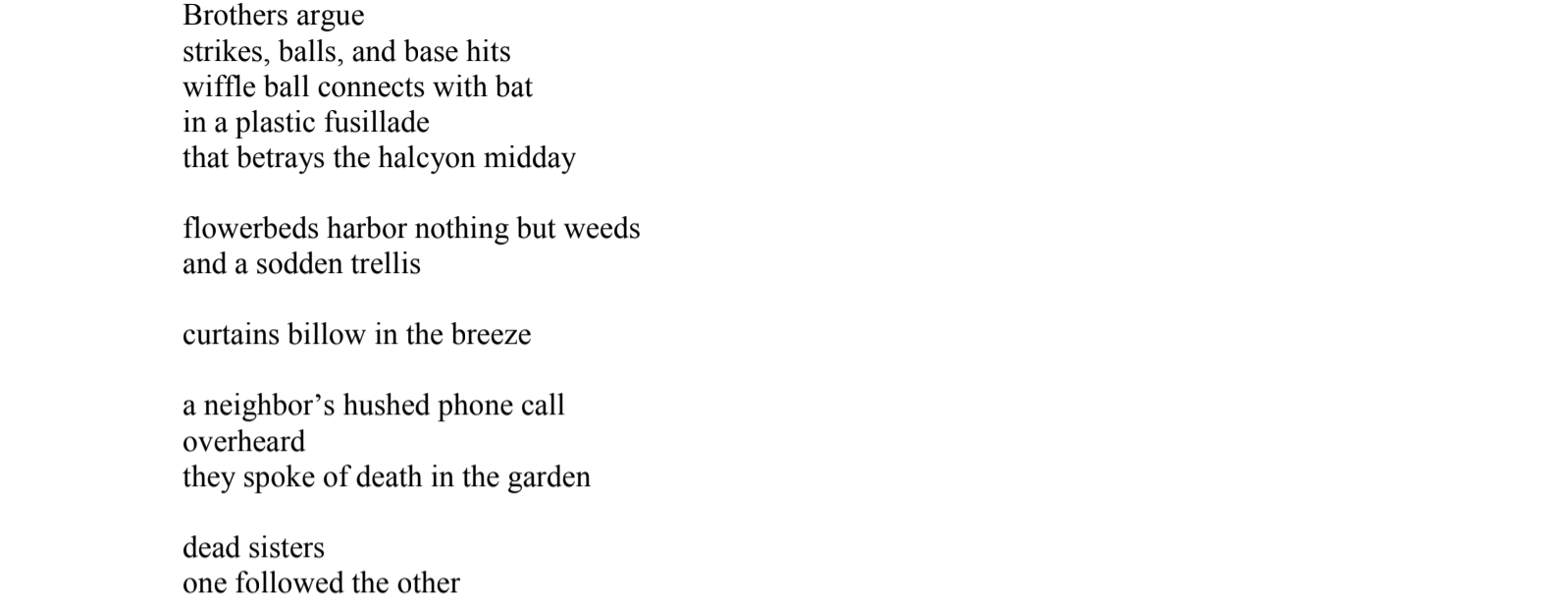
Poem by Will Dutcher, 2019
Where do you feel most creative?
I feel like you’re really creative when you’re in a group of likeminded people and you can talk about stuff, but I don’t think that’s realistically where people actually make art. If I’m at my desk, and everything is clean [laughs], I think that’s where I actually get work done. I like being around my stuff, in my own space.
Do you explore other avenues of creativity outside of writing?
In high school, I did a lot of pottery--wheel-thrown clay stuff. I really love traditional art like that. I’ve sketched and drawn a little bit. I’m trying to learn piano. I like the idea of film photography; it feels so romantic, but I don’t know anything about film cameras, so. I want to do a lot, there’s just a lot to learn.
"I've always had this thought that writing is egotistical, kind of? Like, I want my writing or words to outlive my own existence. So then I have to ask, am I doing this because I like it or because I can outlive myself?"
Have you ever “put writing down,” deciding maybe you didn’t want to do it?
I’ve always had this thought that writing is egotistical, kind of? You can be tempted to think of yourself as immortal--like, I want my writing or words to outlive my own existence. So then I have to ask myself, am I doing this because I like it or because I can outlive myself? So there’ve been times where I’ve felt kind of shitty about writing. But when I stop, I’m like, “I should probably do something with my time…” and I start writing again.
Speaking of doing nothing (seems like most of us have had a lot of that, thanks to the ‘rona), what do you do when there’s nothing to do?
Well, recently, it’s been running and working out just to clear my head. It used to be skateboarding; just getting out of the house and moving. To write, I have to be thinking clearly, so I have to do stuff that clears my mind. If I don’t, I start overthinking, so I need to keep moving.
Tell us about three creatives you admire.
There’s this Belgian painter named Sam Dillemans, and I actually don’t know, really, anything about his work. [laughs] But there’s this video of him talking about creativity and I love that video. I think it accurately depicts how hard it is to create, but that the process is ultimately a rewarding one. I love how he is almost consumed with his work to the point that he and it are the same thing.
Then there’s Hanif Abdurraqib [who I mentioned earlier]...I was already interested in his writing, and then I got to see him speak once, which was really cool. He writes these music reviews that are just personally connected to him in such a beautiful way. I’ve never seen anyone do that before. And his poetry--I always thought of poetry as this controlled, structurally strict thing, and [Hanif’s] work does take that structure into consideration, but it’s...not traditional.
Someone that also got me into reading in a different way is Haruki Murakami. I read The Wind-Up Bird Chronicle in a time when I was only reading Fitzgerald and shit, and that’s not bad, but it’s definitely different. I don’t think I’d read anything contemporary and current at the time. I really respect [Murakami] as an artist. Something about the way he speaks has always stuck with me.
"If you really feel like it doesn’t exist, that means it’s time for you to be the voice that you’re not hearing."
What advice would you give to young Black creators, specifically?
Don’t think that because your experience isn’t included in what you’re watching, reading, or consuming, it’s not out there. There are people who do [talk about it]. Keep discovering stuff. Don’t assume the content doesn’t exist just because you’re not seeing it.
And if you really feel like it doesn’t exist, that means it’s time for you to be the voice that you’re not hearing.
Writer's Note: this is the poem that connected me with Will on Instagram. It remains one of the most beautiful, heart wrenching things I've ever read.
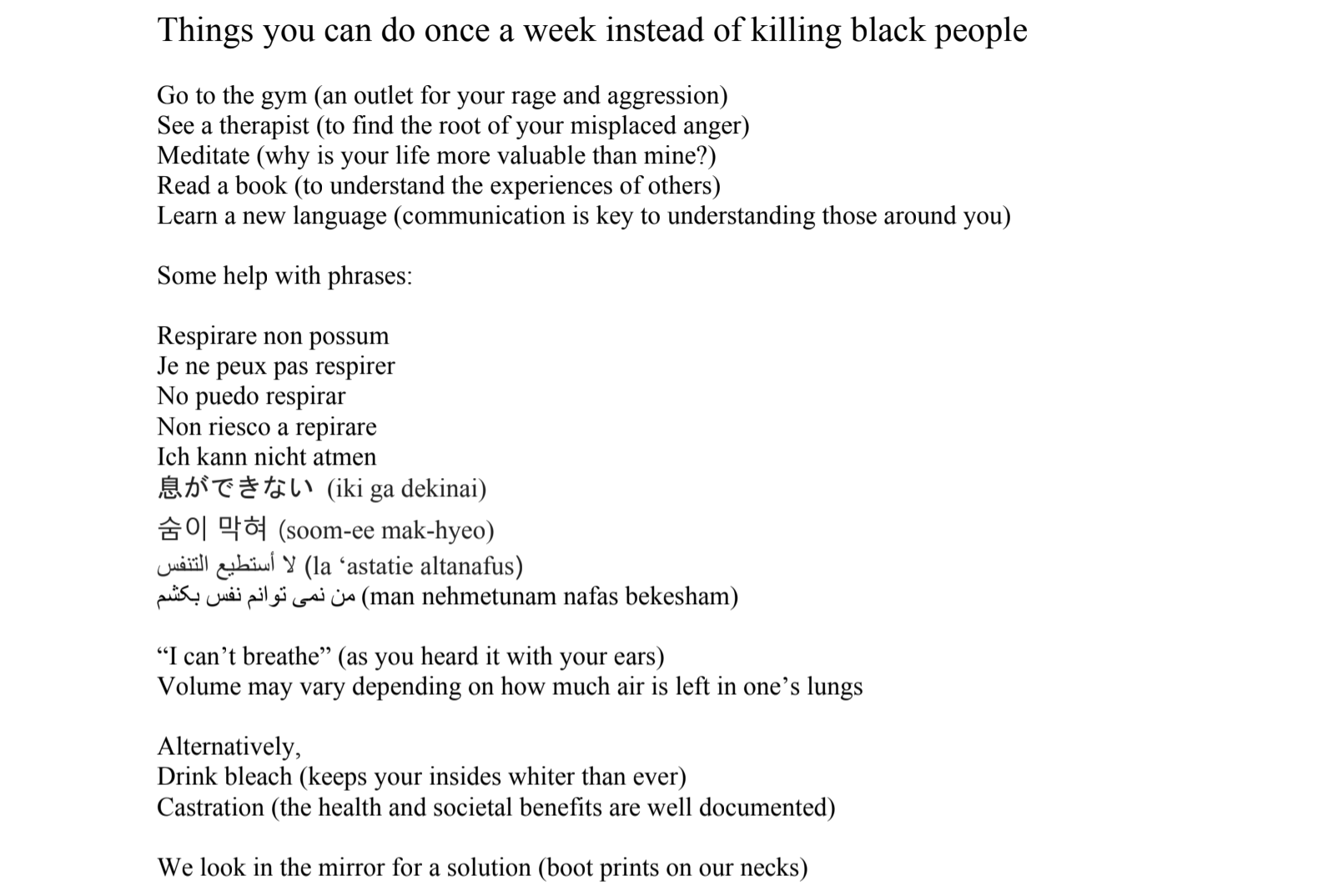
"Choking," Will Dutcher, 2020
Have you experienced any unique challenges to being a Black creator in America?
For me, personally... I’ve never officially published anything, so I’ve never gotten any backlash or anything like that, but I think being a Black creative is difficult because, especially growing up in Texas, you don’t feel like there’s a community. Everyone is writing but you feel like none of it is relevant to you. Or it’s like in school, “This is low-key based on slavery, so why do I have to read this? Why are we celebrating this author?” So you’re trying to connect and make art while dealing with things like that.
Also, actual hardship and perceived hardship are two different things. Do you know “Walden” by Thoreau? That guy is basically living in his mom’s yard. You can say whatever you want about living on your own and being self-contained and all that, but if your mom is like, [doing your laundry] the entire time, does it matter? Are you actually living the life you’re preaching? But somehow people love it; I don’t know. I just can’t appreciate some of it on face value. Someone’s probably going to be mad at me for saying that, but. [laughs]
(Editor’s Note: Confirmed. Walden sucks.)
Have you ever created something that you loved, but other people hated?
I’ve shown work to people who didn’t agree with the direction it goes, and when that happens you can do one of two things: you can take their opinion into consideration and try to change the work, or you follow your own voice.
There’s more to be said about how or why you’re saying what you’re saying, than there is about the way people choose to consume it.
What’s your favorite thing you’ve ever created?
I’ve never really thought about it. It’s weird because I don’t feel super attached to the things I’ve written. I do feel more connected to my recent work that is socially or politically involved, even if I don’t like the art of them--like the images--as much.
What’s next?
Poetry-wise, I’m hoping I can build an audience and self-publish. I’d like to submit some things to journals for publication, but it’s pretty scary. So for now, I just want to get enough written that I feel good about putting together a small collection.
Hard copy or digital collection?
I always think with poetry, you should feel it, you should hold it, which [played into] my resistance to Instagram. If I write or read something, I want to feel it physically, so I would want to give people that experience. For practicality, though, I’d do both...put it online and have a physical copy.
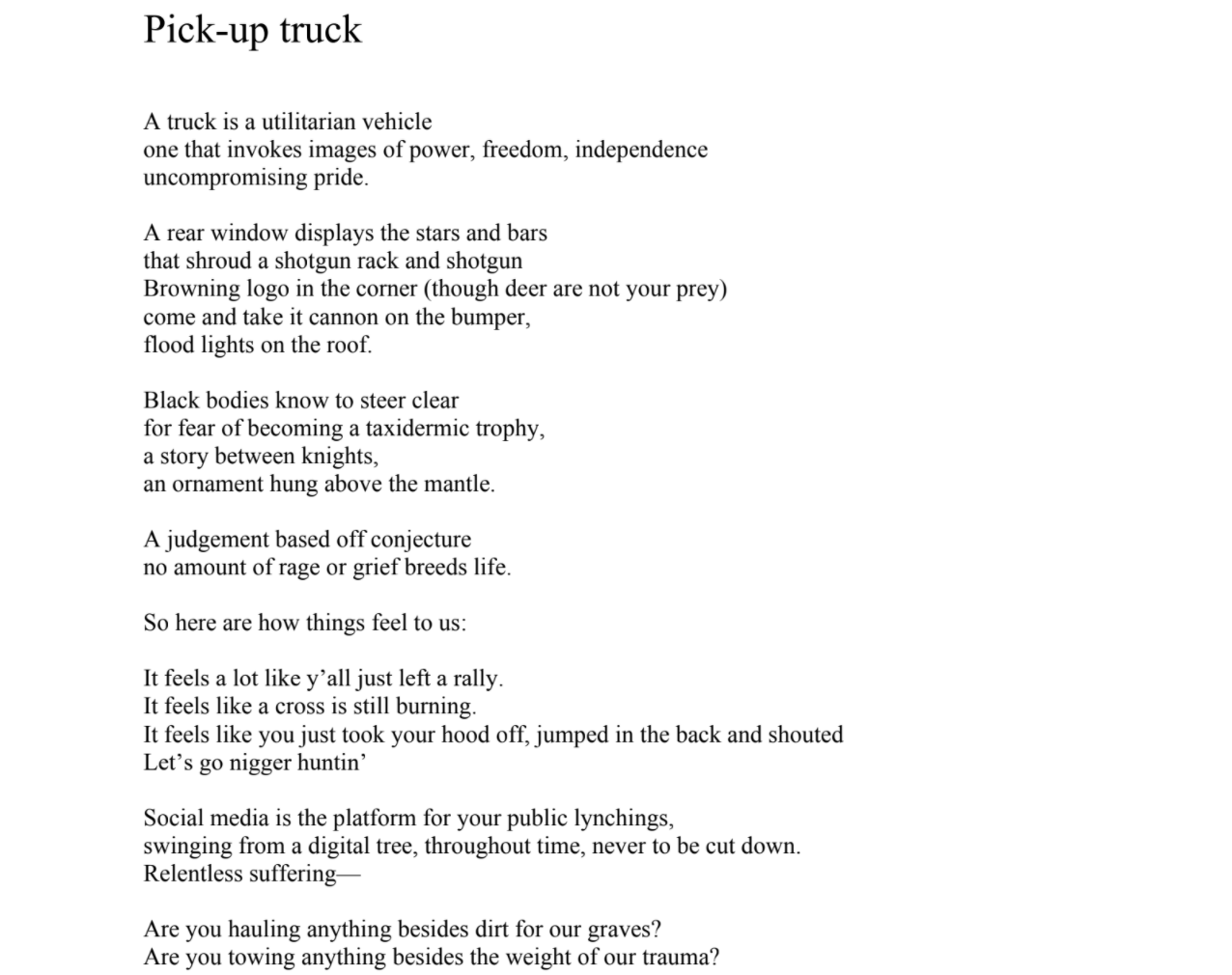
Pick Up Truck, Will Dutcher, 2019
How do you balance staying engaged in the world and mental self-care?
I’m terrible at balancing stuff. [laughs] I think you gotta know when things are more damaging than they are helpful to you. Like, with Instagram, you can scroll for two or three hours and you’re just laying there; you’re not doing anything. On some level, I’m learning things, but also now I’m just getting angry about stuff, so I gotta take a step back and put that feeling into art. That’s why I think [learning to play] music would help, because it’s so tied to emotion without directly saying what you’re feeling. Hopefully, I’ll get there.
Last question. We’re all about tacos, obvi. What’s your favorite taco filling?
I’m a really big fan of carnitas. I feel bad about it, because I’m trying not to eat meat, trying to be more cognizant of what I’m putting in my body, but damn, it’s clutch. Also, breakfast tacos with potatoes and maybe bacon?
Photos: @pari_photos
Mad love to Will for taking over an hour out of a busy day to chat. Follow him on Instagram at @bummerlite for more.
Don't forget to check out our other Conversations here!









